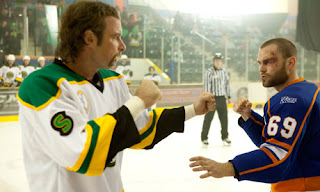 |
| Liev Schreiber and Seann William Scott |
Directed by: Michael Dowse
Starring: Seann William Scott, Jay Baruchel, Alison Pill, Liev Schreiber, Kim Coates, Eugene Levy and Marc-Andre Grondin
While the sports media and fans across Canada continue to debate the pros and cons of allowing fighting in the NHL -- and hockey, in general -- Jay Baruchel has produced, written and co-starred in a film that focuses solely on the controversial role of the enforcer. Are they really essential to the success of a team? Or is it just an excuse to give bloodthirsty fans what they want? Goon never truly addresses these questions in depth, as it focuses more on being as equally violent and crude as its 1977 predecessor Slap Shot.
Doug Glatt (Seann William Scott) is a small-town Massachusetts bar bouncer with both a kind disposition and a killer punch. As one character puts it, "you are touched by the fist of God." After getting into a scuffle in the stands while attending a hockey game with his friend (Jay Baruchel), Doug is spotted by the head coach (Nicholas Campbell) of the visiting team from Oshawa. He convinces Doug to leave his hometown to play in Canada for the Halifax Highlanders, a struggling hockey club coached by his brother Ronnie Hortense (Kim Coates). The Highlanders are still reeling from last season's crushing injury of their star forward Xavier LaFlamme (Marc-Andre Grondin) who was concussed by Ross Rhea (Liev Schreiber), the head goon of the St. John's Shamrocks. The Highlanders want revenge and, despite the fact that Doug can't skate and knows next to nothing about the game, he's warmly embraced by the guys -- all of whom can't wait to see him in action as their enforcer.
Goon is at times a biting satire -- a crude, rude glimpse at the bloodlust often associated with the sport of hockey. Like gladiators in the Coliseum, the central spectacle is often the two men duking it out with their fists at centre ice. While hockey can be a beautiful, graceful, high-speed game, it can also be a violent spectacle more akin to boxing -- and Goon doesn't hold back on the punches. The blood spurts, squirts and gushes in an increasingly creative (and bone-crushing) fashion. It's not for the faint of heart and there will likely be many who argue that it does little to improve the current state of violence in the game.
 |
| Marc-Andre Grondin |
As Ronnie, the Highlanders' charismatic head coach, veteran Canadian actor Kim Coates is all fiery venom. He embodies the very essence of a tough-love coach who just wants to see his boys succeed.
Marc-Andre Grondin (a familiar face in Quebec cinema) is excellent as Xavier LaFlamme, the surly superstar with a once-bright future who is struggling to overcome a nagging concussion and an overwhelming fear of being crushed into the boards again. The slow-to-blossom friendship (and mutual understanding) between Xavier and Doug is one of the highlights of the film.
However, the standout is Liev Schreiber (mastering a Canadian accent) as the aging enforcer, Ross Rhea. He perfectly balances the showmanship involved in the role of the goon while, in quieter moments, illustrating the hardships that men like him endure. He loves his role, yet he's aware that he's there for one reason only -- to spill blood. The role of a goon is ruthless, not only to the player on the receiving end of the punches, but to the goon himself.
It's an unapologetically violent critique of violence in hockey -- a feature that will likely prove too controversial to some critics and audiences. The film likely won't convert the uninitiated; however, for those who love hockey Goon is an entertaining glimpse into the world of the minor leagues.
FINAL GRADE: B











